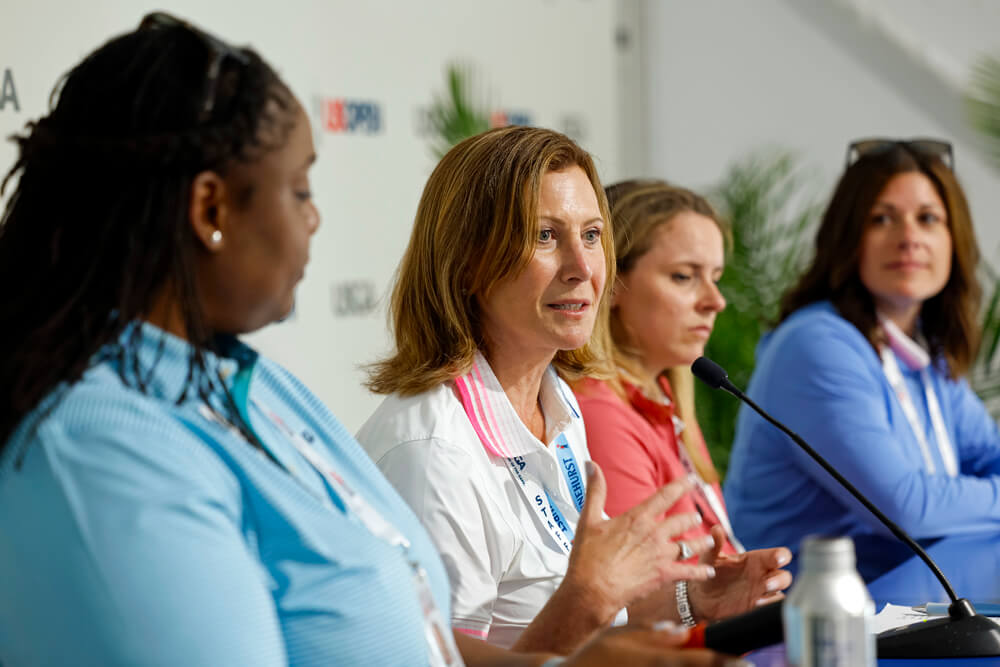[ad_1]
Closing in on a decade as the first chief financial officer at the United States Golf Association, Susan Pikitch has reached the sweet spot in professional life few bean counters get to enjoy: the satisfaction of affecting the future instead of accounting the past. Working for the mission-driven USGA has allowed Pikitch to be what she calls a “CF-Go” instead of a “CF-No.” “On the finance side, there’s a perception that a CFO’s job is to say no when people want to spend money,” she said. “And you know, and when you’re a CF-No, you will not be invited in the room before decisions are made. You will be there when they need someone to budget for it, or write checks.
“Being a CF-Go really means to think about putting yourself in the shoes of the business person that you’re trying to support and help them achieve their goals. Point out some of the risks, but point out some of the opportunities as well as point out what that financial investment or return could be. Be a business partner, not just someone who is the judge of saying yes or no to certain things.” Armed with a degree in economics and accounting from Brooklyn College and an MBA from the Stern School of Business at New York University, Pikitch started her career in corporate America working as a senior executive for three Fortune 500 companies, the majority of it at McGraw Hill publishing company.
In the corporate realm, Pikitch found she spent more than half of her time dealing with all the essential accounting, reporting and compliance, leaving her little time to focus on what she could do to help grow the business and make it better and more efficient. That’s what made going to work for the USGA – a mission-driven organization less worried about the bottom line and more focused on long-term vision – so appealing. “It’s not worried about monthly closes and quarterly earnings releases,” she said of the USGA. “Obviously, there’s always going to be some level of compliance in any finance function. But sometimes in a public company, finance usually comes first, and then mission comes second. And at the USGA, mission comes first, finance comes second.”
Her first few years of “not as sexy stuff” – professionalizing the USGA’s finance infrastructure via upgrading talent, systems and processes to build the foundation to be able to make more informed business decisions – paid dividends when Pikitch and the USGA were confronted with navigating the pandemic. “We were kind of in crisis mode,” said Pikitch, who helped steer the organization through COVID despite its primary revenue source, the U.S, Open, being postponed and played without fans. “So how do we hunker down? What decisions can we make without really cutting into the mission of the organization?”
That foundation she built included the foresight to have event cancelation insurance, which helped with the revenue losses of not having fans. That let them be able to support and grow one of the few activities that was safe to play during the pandemic – something still benefiting the recreational game with increased participation borne out of a crisis. “That foundation and groundwork that was laid allowed us to be able to fulfill our mission during the most difficult times,” Pikitch said. In addition to her financial accountabilities, Pikitch has been able to deploy her CF-Go philosophy in overseeing the USGA Museum & Library, World Golf Hall of Fame exhibit, the USGA Foundation, facilities, information technology and the GHIN platform and golfer app.
“I also was given responsibility for real estate, which was basically campus operations, where we renovated our New Jersey campus and then ultimately built our Pinehurst location,” she said. While the pandemic might have been the biggest challenge, Pikitch lists turning around and re-platforming the Golf Handicap & Information Network among the proudest accomplishments. “We were in the process of trying to rebuild that system ourselves, and that project was not going well,” she said of the task she inherited. “We hadn’t delivered. We had cost overruns. And our customers, which are really the Allied Golf Associations who support handicapping throughout North America, were very, very angry with the USGA.
“So we kind of pivoted, brought in Golf Genius to help us on the software development side, and were able to relaunch in 2020. Since that time, we’ve just continued to grow the functionality of both the administrative back end, but more importantly, the GHIN app where you can experience a handicap trial and actually then purchase a handicap and get your membership to your Allied Golf Association as well. This is really to attract new golfers that don’t have a handicap, that don’t think they need a handicap.”
In May, Pikitch was elevated to chair of the LPGA Foundation, a role that aligns with her goals. It was while working at McGraw Hill that Pikitch recognized the intrinsic value of the game in her professional life. Growing up in New York City, she was never exposed to it. But as a senior executive at strategic planning sessions, invariably held at golf resorts, she realized what she was missing. “I would play tennis or go shopping, and the mostly men at the time would go play golf, and they’d come back telling these fun stories about birdies and bogeys and just clearly having a wonderful time and getting to know one another so much better,” she said.
So she and her husband, Michael, decided to learn the game, spending their free and vacation time taking lessons and hitting balls until they became proficient. Mentored by mostly retired women in a nine-hole ladies league, Pikitch worked her way to a 21 handicap and even won her club championship at The Vineyards in Riverhead, New York. “There weren’t that many great female golfers at the time, but nonetheless, I had the trophy,” she said. With the LPGA Foundation, Pikitch hopes to ensure there are more good female golfers. “My passion is helping women, mentoring women, and using the gift of golf to help them pursue their career aspirations, as well as their personal aspirations,” she said. “So having the opportunity to work with an organization that is exclusively focused on women and girls and growing the game for them was a dream come true.”
The biggest program the LPGA foundation runs is LPGA*USGA Girls Golf. Founded in 1989, the program took 34 years to reach its first 1 million girls through 550 sites worldwide. Pikitch now leads a campaign to raise $13 million so it can reach its second million by 2030. “I certainly wish I had been exposed to a program like that when I was a young girl,” she said. “They not only learn golf, but they kind of learn life skills and values and how to be a leader.
“What this program is doing, which is also near and dear to my heart, is we’re looking at growing the number of chapters in inner cities where there’s less access to golf. Also looking at more diversity within the ranks. The USGA is the largest contributor on an annual basis, and all of our funds go towards, we call them scholarships, but towards girls who can’t afford to otherwise be in the program.” Nancy Henderson, president of the LPGA Foundation, says Pikitch’s “leadership exemplifies a commitment to fostering inclusivity and opportunity within the sport, inspiring future generations of female golfers to excel.”
[ad_2]



